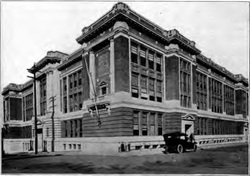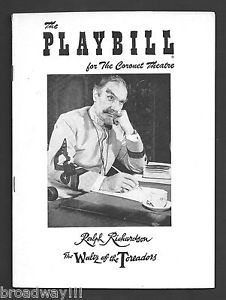
This is a question familiar to many acting students. Novice performers who tear into a scene filled with dramatic conflict are brought up short by the criticism that all their effort is coming across as just so much sound and fury signifying nothing… because the audience is unable to discover the love between the combatants. “But it’s not there! They’re enemies!” I remember arguing. To which the response is, “Then you must find a way to put it there.”
Yesterday, I found out that my mentor in theatre had died. I had not seen him in thirty years, and I was surprised by the emotions that arose for me.

Jack cast me in a lead role of a play that went on to win regional and state competitions, touring eventually to the Kennedy Center for the prestigious annual American College Theatre Festival. I remember the rehearsal we had the night before we flew out. Jack was giving little touch-up notes to the cast. When he got to me, he stopped, and then he said, “And as for you, I don't know what to say.” It was a devastating note. He had done it in front of everyone. I was, apparently, beyond help. My performance was hopeless. I was going to doom all of us to failure. I was the Jonah on board, but it was too late to throw me overboard.

In spite of the fact he had cast me in the leading female role, Jack gave the final curtain call to the supporting actress. This insult was emblematic of our dynamic for four years. He could not ignore my ability, but he could and did take every occasion to withhold acknowledgement of it.
Jack was my adviser for my directing thesis project, but I could not get him to come see the play until right before it opened. When he finally did attend, he gave me a list of changes that were too sweeping to implement at such a late date, but that left me with the understanding that the production was terrible.

Jack and I finally came to a breaking point. It was close to the time of my graduation. I cannot remember the issue… it may have been one of my final attempts to get him to view my thesis work. What I remember was being in his office and breaking down in tears of rage and frustration. I remember Jack was appalled. It was if I had vomited on him. He didn’t know what to do, and I was beyond caring. I just sat there and cried.
Directly after this, I remember I went to a playwriting class. I was still crying, still sobbing. This is an odd memory, because I was normally a very reserved person. Whatever was happening to me that day was so momentous, I had become oblivious to my surroundings.
Jack personified the world of commercial theatre, and even though he had left it in the early 1960’s, and even though it was now the 1980’s, little had changed for women. In fact, today, thirty years later, there has still been little change for women. My experience with Jack, bitter as it was, turned out to be a blessing. It spared me years, maybe decades, of searching for a toehold in a male dominated industry that had a particular aversion to ambitious feminists. When I remember that afternoon with the out-of-control crying--which was a mystery to me at the time--I believe it signified my letting go of all my dreams of a career in theatre. I believe that I was understanding that there was no strategy that was ever going to gain me membership in this boys’ club of boys’ clubs, and that what I was experiencing with all those tears was grief, but also relief.
For thirty years I would struggle with the limited resources, the obscurity, and the internalized oppression of working in lesbian communities, but I was spared the dance of femininity and appeasement that engaged and exhausted the best energies of so many of my peers. I would never lend my talents to a “ladies’ auxiliary” in theatre. I would luxuriate in the freedom to write without compromise or censorship, and for a population of lesbians, feminists, girls, and especially survivors of sexual abuse whose stories are routinely appropriated, distorted, or erased in so-called “universal” drama of mainstream theatre.
So, Jack… I missed your memorial service. I would have liked to have gone. And if there had been an occasion to speak, I would have made “Where is the love?” my text. I know where the love was for you. It was theatre, and good acting . It was the honesty of a scene, the integrity of the action. And I know from your obituaries that the love was also in the volunteer work of your post-retirement years. You worked as a counselor on a substance abuse hotline, an ombudsperson for eldercare, and as a Court-Appointed Special Advocate (CASA) for neglected and abused children.
And where was the love for me, in my experience as your student? Well, I will just have to put it there.

 RSS Feed
RSS Feed
